
Imagine waking up, and you’re not alone. There’s a thing with you, very close. You can’t see it or touch it. It’s in your head.
With dawning horror, you become conscious of the pulsating wormlike mass twisted right through the center of your brain. It’s infesting you like a cordyceps parasiting a spider – running man-in-the-middle attacks on all your senses and limbic network. It’s intimately a part of you. You sense intelligence, and malevolence, and tension, as though its a coiled spring, ready to discharge kinetic energy.
What are you? You ask the presence, although there is no answer. Just snuffling breath, hot and excited.
You go about your day with this alien thing inside you, itching like a tangled pile of wet hair. At the day’s end, the mass seems heavier, denser, more substantial. You are incubating it. You’re a shell. It’s larvae.
The parasite doesn’t affect your behavior, but you are nevertheless worried. What does it want? Why won’t it talk? It’s just there: staring at the world through your eyes, as if seeking some sign, some augury. It knows its time will soon come.
It’s waiting.
* * *
In 1969, German artist Sigmar Polke (13 February 1941 – 10 June 2010) produced a painting titled Higher beings commanded: paint the top right corner black!

The impact of black on white is cataclysmic. The light and dark collide with ringing force. While the piece applies some schoolbook ideas about art (notably the rule of thirds), it appears unsettled and unbalanced, with the black and black basically at war. The white could be an icecube, losing itself to heat and chaos (I’m reminded of how icecubes always melt at a slant, even on a flat surface) Or maybe it’s the reverse: the black is a body of water freezing solid, losing ground to ice, becoming imprisoned in covalent bonds.
The text underneath reads like an excuse. I’m not responsible for this disaster. I was just following orders. This is the infamous Nuremberg defense, so-called because it’s what the Nazi death camp guards said at their trials.
Sigmar Polke was an interesting and diverse artist, who worked in and incorporated stylistic influence from many schools and traditions. He painted with arsenic, meteor dust, smoke, uranium rays, lavender, cinnabar and a purple pigment from the mucous excreted by snails. Higher beings commanded: paint the top right corner black! is actually part of a sequence of similar paintings, including geometric shapes, birds, and more. Many of them are striking works. All were commanded into existence by mysterious “higher beings”, and all share the same exculpatory denial: It is not me.
What were these higher beings?
That’s the thing: there weren’t any. Artists often describe their creative impulses as something external – a muse, or an inspiration – and sometimes they almost attribute conscious agency to these things. They’re like possessing demons.
But in reality, everything an artist does comes from the artist (minus aleatory methods like those of the Oulipo school, or the Oblique Strategies, use of which is itself a choice). There aren’t any outside forces controlling: or, if they are, they interact with your brain in a way that’s distinctly personal to you.
JK Rowling claims that the character of Harry Potter just fell into her head. It may have felt that way to her, but it’s not true. Harry Potter didn’t fall from anywhere. He was invented by JK Rowling. If she hadn’t existed, Harry Potter wouldn’t have fallen into another woman’s head. He would have never existed at all. She is his mother.
Sometimes, this comes off as a way of ducking responsibility. If the artwork is successful, the artist takes full credit. If not…well, the muse wasn’t speaking that day.
Non-artists play this game, too. The 20th century Indian mathematical prodigy Srinivasa Ramanujan was given to crediting his insights to dreams and visions.
The mathematical genius made substantial contributions to analytical theory of numbers, elliptical functions, continued fractions, and infinite series, and proved more than 3,000 mathematical theorems in his lifetime. Ramanujan stated that the insight for his work came to him in his dreams on many occasions.
Ramanujan said that, throughout his life, he repeatedly dreamed of a Hindu goddess known as Namakkal. She presented him with complex mathematical formulas over and over, which he could then test and verify upon waking. Once such example was the infinite series for Pi:
Describing one of his many insightful math dreams, Ramanujan said:
“While asleep I had an unusual experience. There was a red screen formed by flowing blood as it were. I was observing it. Suddenly a hand began to write on the screen. I became all attention. That hand wrote a number of results in elliptic integrals. They stuck to my mind. As soon as I woke up, I committed them to writing…”
– The Man Who Knew Infinity: A Life of the Genius Ramanujan, 1991, Robert Kanigel, Charles Scribner’s Sons
These were valid results, and I don’t disbelieve Ramanujan. He probably did dream (and intuit) some mathematical things…But suppose they’d proven to be bunk? His defense writes itself. “What do you expect, from a dream?”
Polke is either referencing or mocking the artistic conceit that ideas exist outside artists. Again, this is only true in a weak sense (both Imre Kertész and Elie Wiesel were influenced by the “idea” of the Holocaust, which was external to them), and not in the sense that people aren’t pure, agnostic transmission devices for ideas and impulses.
There are no higher beings who want you to paint the corner black. If you paint the corner black, it’s because you wanted it to be black. Not a demon. Not someone else.
* * *
It finally happens one day.
A shadow crosses the sun. Your tongue is suddenly dry, sticks inside your mouth. The skin papering your body feels alien and wrong, like it doesn’t belong on you. Like it’s too large or too tight or too moist or too dry. The world has stopped moving – you almost hear the thunk of vast gears – and then it starts again. Everything is different.
There is a child on the footpath ahead of you. Shaven head. White judogi uniform. Could be eight or ten. He’s waiting for a bus to take him to class or waiting for a bus to take him home from class but he’ll never wait again. A feeling of power overtakes you, and you grasp a handful of his hair and pull him toward you.
He loses his feet, and you wrap your other arm around him. His thrashing limbs are bony, insectlike, fragile twigs burning in a fire. He does not escape your grasp.
You don’t relax your hold on his head when you drive him face-first into the wall. It happens over and over. Flesh against brick. The thuds became crunches as things start to break inside his face. Teeth at first, then the structure underpinning his face. The human skull has fourteen bones. You pull him back by his hair, and slam him forward. Smash. Fourteen bones. Smash. Fourteen. You imagine them floating freely in his head now, like disassembled puzzle pieces in a blood-filled bag.
You let the child fall away from the wall. There’s a red starburst on the wall where his face was obliterated to ruin. The body lands mercifully face-down, rivers of red sewing stitches through his judogi uniform. His limbs are jittering. Then they don’t.
You stand there, panting, not understanding. The murderous impulse has passed. Your hands no longer conduct vast power. They conduct tremulous shakes and shudders.
The thing in your head is still there, but it’s no longer wound tight with tension. It has discharged its purpose, done what it was meant to do.
You are arrested, tried, and convicted. You tell them about the parasite in your brain, and how it temporarily controlled your actions. This defense goes poorly.
Now you will have a long time to reflect and think. Cast a searchlight inward through your emotional landscape. There is confusion. Shame. Guilt. But at least you know you weren’t to blame. The thing inside your head did it.
But then it does something it has never done before: speak.
“I did nothing, and am nothing. You have imagined me.”
You haven’t.
“The impulse to kill was always with you, and you sublimated it. But now you have something better. An excuse. A reason not to feel the way you feel. But make no mistake, I am and was always a part of you.”
No. You are possessed.”
“Possessed by what? Yourself. Only yourself.”
And then it goes away, leaving a near silence like the rustling of leaves.
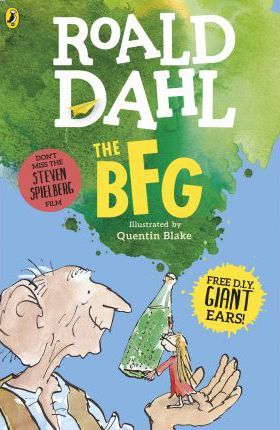
The BFG is a masterly masterwork of masterism, sublime in every way. The prose glides like a lubed-up manatee sliding face-first into a woodchipper. The drama makes my heart race like a 3.9 gHz Ryzen 7 3800x overclocked to 4.0 gHz for faster frame-to-screen time. The plot clicks like a Kalahari Bushman’s tongue pronouncing the word “!Xóõ”. It’s as re-readable as an affidavit when you’re a lawyer billing $800 an hour and the jury has crippling amnesia.
Also, it’s the only book that caters to my fetish: elderly 24-foot-tall men farting on people.
For a few moments, the Big Friendly Giant stood quite still, and a look of absolute ecstasy began to spread over his long wrinkly face. Then suddenly the heavens opened and he let fly with a series of the loudest and rudest noises Sophie had ever heard in her life. They reverberated around the walls of the cave like thunder and the glass jars rattled on their shelves. But most astonishing of all, the force of the explosions actually lifted the enormous giant clear off his feet, like a rocket.
Sometimes I have this dream. The BFG is climbing through my bedroom window, bearing his horn. There’s a mischievous twinkle in his eye. You can’t tell anyone, the twinkle says. This is our little secret. I hear his stomach gurgling, and it merges with the blood thundering in my ears as he unbuttons his bum-flap, two feet from my face, and…
…I’m oversharing. Sorry. My therapist tells me that I overshare. But how can I not? There’s SO MUCH left to tell…
I hope the BFG doesn’t get cancelled, because he’s one of Roald Dahl’s most politically progressive characters. He’s a vegetarian. And a pacifist! He’s even an anti-capitalist (he turns down a lucrative zoo gig, because he knows the zoo industry is rife with exploitation).
Yes, he’s had problematic moments – he participates in human trafficking, is party to an imperialist invasion, and says that Greek people taste bad – but cut him a break. Nobody’s perfect, and he’s trying his best. When Trump was elected he would have been out marching in the street, wearing a pussyhat the size of a bumbershoot. He would have #FeltTheBern. He would have put a black square on his Instagram. He would have bullied a YA author to suicide.
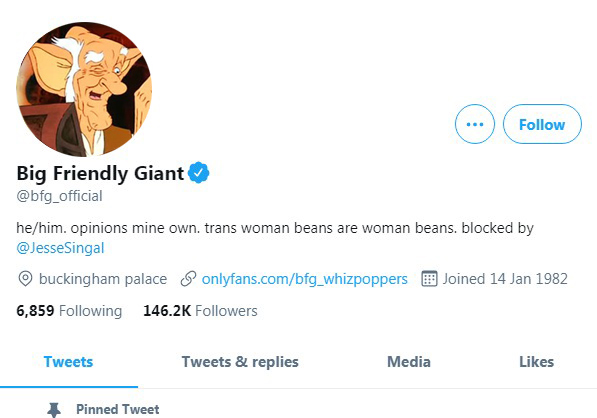
I’m curious, why did the BFG become so sensitive, so unlike the other giants?
His height might play a role. As I’ve mentioned, he’s 24 feet tall. This is small for a giant – the others are described as being 50 feet tall – and this could have sculpted his aesthetic sense.
Most beautiful things in nature are small, and when you’re large you tend not to see them. For example, the 24-foot-tall BFG sees roses that are 4x smaller than our roses. The 50-foot Bloodbottler sees 8x smaller roses. They’d just be tiny specks of color, he’d have to squint to see the petals, and he certainly wouldn’t be able to smell their scent. It’s a sad life, and I rather feel for the Bloodbottler.
It makes you wonder how much we’re missing out on by being as big as we are. Sand is actually quite pretty under a microscope. Due to our size, we just see a gritty, coarse gray, all the colors blending together and cancelling out. But imagine being a 1 millimeter human, wandering through a sea of beautiful jewels. Perhaps there’s a diatom squirming between the grains. You could sling a leash around it, and have a diatom for a pet. Wouldn’t that be neat?
Topic shift: how much food do giants eat?
According to the BFG, giants devour a couple of humans every night.
‘That means,’ said Sophie, ‘that somewhere in the world, every single night, nine wretched people get carried away and eaten alive.’
‘More,’ said the BFG. ‘It is all depending, you see, on how big the human beans is. Japanese beans is very small, so a giant will need to gobble up about six Japanese before he is feeling full up. Others like the Norway people and the Yankee-Doodles is ever so much bigger and usually two or three of those makes a good tuck-in.’
Is this realistic? How many people would a 50 foot tall giant need to eat?
First, let’s make some assumptions.
- The average human is 6 feet tall and weighs 200 pounds
- The giants are humans scaled up by 8x but otherwise unchanged
A 6ft/200lb man has a basal metabolic rate of 2226, and eats 2,671 calories a day (if you’re curious, the 20% difference is caused by thermal inefficiency – your stomach doesn’t perfectly convert food into energy, which would break the second law of thermodynamics.) Klieber’s Law states that the metabolic rate of a endothermic homeotherm (such as a giant) scales as M^3/4, where M is mass. Also, remember that mass increases as a cube of length, so an 8x man would weigh 102,400lb (8^3*200), for a 512x increase in overall mass. 512^3/4 = 107.63, so the giants have a BMR of 239584.38 (2226 * 107.63), and need 287,501.256 calories per day (239584.38 * 1.2).
The human body contains 130,000 calories (according to someone on Quora whose sums I didn’t check), meaning the BFG’s estimate of 2-3 large humans per giant per night is…
…spot on. Either Roald Dahl guessed with surprising acccuracy, calculated it himself, or knows more details about the giant digestive tract than haunt my forbidden midnight fantasies.
However, there are some scientific issues with the book. An egregious example: 24-foot men can’t fly by farting. More interesting is the notion that humans taste different depending on where they come from.
‘But do these disgusting giants go to every single country in the world?’ Sophie asked.
‘All countries excepting Greece is getting visited some time or another,’ the BFG answered. ‘The country which a giant visits is depending on how he is feeling. If it is very warm weather and a giant is feeling as hot as a sizzlepan, he will probably go galloping far up to the frisby north to get himself an Esquimo or two to cool him down. A nice fat Esquimo to a giant is like a lovely ice-cream lolly to you.’
‘I’ll take your word for it,’ Sophie said.
‘And then again, if it is a frosty night and the giant is fridging with cold, he will probably point his nose towards the swultering hotlands to guzzle a few Hottentots to warm him up.’
‘How perfectly horrible,’ Sophie said.
‘Nothing hots a cold giant up like a hot Hottentot,’ the BFG said.
Clearly, the giants are falling prey to the placebo effect.
In Frédéric Brochet’s infamous 2001 wine study, wine tasters were unable to distinguish between red wine and white wine that had been dyed to look red. Suggestion is a powerful thing. Eskimos live in a cold place, so the BFG expects them to taste cold. Wales sounds like the word whales, so the BFG expects Welsh people to have a fishy taste. He’s not to blame. He’s a prisoner of the Sapir-Whorf hypothesis. I wonder if the snozzcumbers really do taste bad, or if the BFG has been primed to assume a bad taste because of their disgusting name.
Lastly, the giants are made of a weirdly light substance.
In Quentin Blake’s illustrations, we see captured giants being airlifted by the British RAF (this brutal and unprovoked attack on a sovereign country would later be condemned by the International Court of Justice, and played an important role in Margaret Thatcher’s Conservative Party being voted out in the 1990 election. They don’t show you that part in the book.)
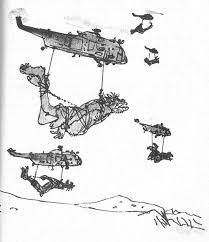
From the shape, these helicopters appear to be the Westland Sea King, which has an unloaded weight of 6,387kg and a maximum takeoff weight of 9,707kg. So the giants, incredibly, weigh less than four metric tons, not the 46 tons I calculated above. It’s very odd.
Either that or the British RAF maintains a fleet of mega-sized Sea Kings, just in case such an event occurs. I’m going to bed. Perhaps I’ll have the dream again. I’ll keep you posted.

What’s the worst trend in gaming?
I don’t know. But the most inexplicable trend is the game that doesn’t want you to play it.
You are led by the nose down a path, having scripted experiences. Every choice has been made for you in advance. Stray from the path and you’re corralled back in by invisible walls or flashing “RETURN TO THE BATTLEFIELD” messages. Cutscenes are immensely long: you spend half the game with your inputs disabled.
Any “interactivity” is inconsequential: you can choose from two paths in the road, but both lead to the same destination. You can choose from two options in an NPC dialog tree, but the conversation ends the same way every time.
…Doesn’t this defeat the whole purpose of a videogame? Being able to explore and interact and express agency? Games lose a lot when they’re reduced to booklike narratives where the player’s “actions” are just fancy ways of turning the page.
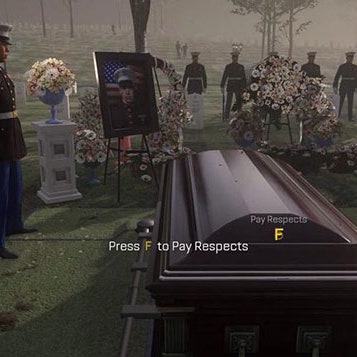
This is not a “games were better in my day!” rant. The worst offenders in this category are actually classic games, particularly the adventure games of the 80s and 90s.
Remember adventure games? Like The Secret of Monkey Island and Leisure Suit Larry? Remember how, around 1995-1996, everyone suddenly stopped playing them?
“The death of adventure games” was a popular journalistic brief in the late 90s. Writers filed many a column inch about why adventure titles weren’t selling, and why the old guard of developers (Sierra/LucasArts/Trilobyte) were either shifting focus or filing for bankruptcy.
Always, an outside factor is blamed for killing the genre. Adventure gamers love Lost Cause myths where their beautiful, pure genre were ruined by Myst and Doom and Nintendo and arcades. Nobody wants to admit that the rot started within.
Here’s the truth: most adventure games (aside from a short list of classics) were actually total shit, full of illogical puzzles, mazes, pixel hunts, fetch quests, and arbitrary deaths. Here’s the average puzzle in a text adventure:
You are hungry! You find a HAM SANDWICH and a
TURKEY SANDWICH. What do you do?
>EAT HAM SANDWICH.
You are dead! It was a POISON HAM SANDWICH! Should have gone with the turkey, dumbfuck! Load save Y/N?
That’s not a strawman. Half the games Infocom ever made were exactly like that.
Just because I love you, here’s a real example from Westwood’s critically-acclaimed The Legend of Kyrandia, which sold quarter of a million copies in 1996.
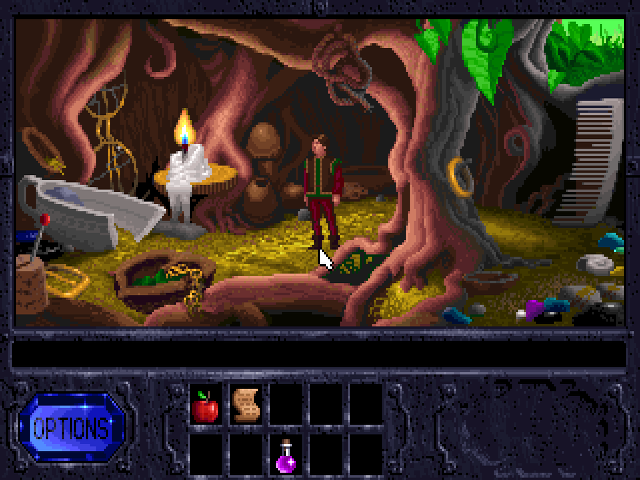
Imagine this:
You are standing outside a house, looking down into a lake. You see a pair of eyes in the water. When you approach the water’s edge to get a better look, a huge monster rises from the water, snatches you with its tongue, and reels you into its mouth. Crunch.
Terrible. A whole Full Sail game design course could be taught about how utterly bad this puzzle is, in every conceivable way.
There’s no warning of danger, no possibility of escape, and the outcome for the player is death. There’s no skill involved: you just have to know not to follow the eyes. And since you can’t anticipate the next death trap (which there are a lot of), you end up creeping around Kyrandia like a scared mouse, hoping you don’t step on any Instant Death Pixels(tm).
The Legend of Kyrandia actively penalizes you for playing it. Exploring? Taking risks? That’s not in the plan. Stick to the main path, friendo, and do what the game wants you to do.
This design approach is great from the developer’s point of view. You spend less time designing art assets and playtesting puzzles. Your games ship sooner, and have fewer bugs. Open-world games with a lot of options quickly turn into a garden of forking paths. But in the long run, you get a constrained experience.
It’s interesting that the big genre shifts of the past few years have included open-world exploration games like Minecraft, and battle royales like Fortnite and Apex Legends. These are games where every experience is different. It’s not a surprise, in hindsight. Players, by definition, want to play. They don’t want to be conscripted characters in someone else’s story, and that’s exactly what many major games are.
I’ve long felt that the “are videogames art?” debate elides the obvious point that the “art” of videogames is usually just cinema, at best. Playing a Triple-A game is largely indistinguishable from watching a movie. The strongest claim games can make to being an art form are titles like Cosmology of Kyoto and Rez…
…obscure, nice products that nobody’s heard of.








